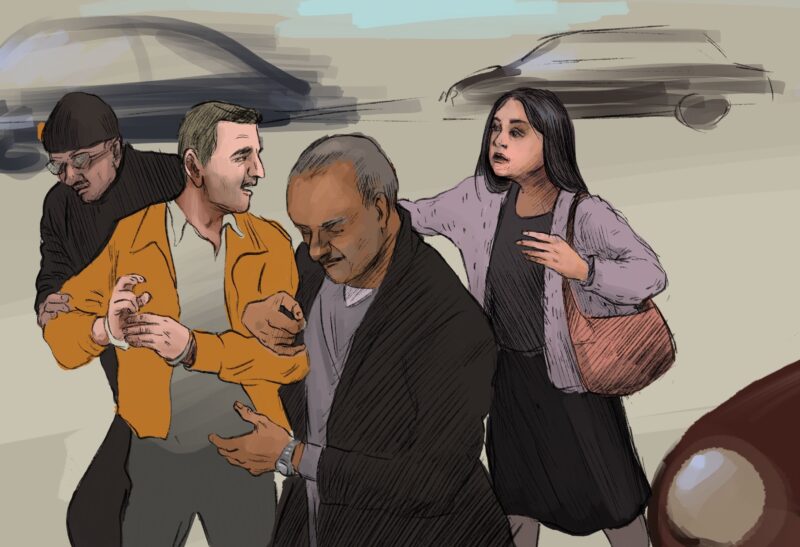Bullying victims in Azerbaijan are often left face to face with their problems
After eighth-grader Elina Hajiyeva committed suicide, the notion of bullying, which was new to many, became one of the main talking points in the country.
The 14-year-old student at Baku school No 162 threw herself out of a window on the third floor of her school during a break. Several minutes beforehand, Elina wrote a suicide note in her exercise book on her desk during a class:
"Do not come to my grave after I die. Do not say that you love me, that you want to see me, that this should not have happened, or that you want to hug me or kiss me. I needed to hear those words when I was alive. You people do not need me."
"They will sort it out themselves"
Elina died in hospital of injuries she had received. She passed away two days after she fell out of the window. Immediately after Elina's funeral, her family said that her classmates had bullied her for years and that this was not the first time she had tried to commit suicide.
Elina started going to school No 162 when she was in fifth grade. Her classmates immediately took a dislike to the new girl and mocked her in all possible ways, says Diana, Elina's cousin who goes to the same school.
"Once, one of Elina's classmates poured a large bottle of water on her in front of everyone right in the classroom. Everyone laughed. She started crying and complained to the homeroom teacher. But the latter only responded that it was her own fault and she must have deserved it".
The girl's grandmother also said that the school management had demonstrated a negligent attitude to the girl's complaints that she was bullied:
"Problems started on the very first day she went to that school. First, one of her classmates started humiliating and insulting her. When Elina told me about it, I went to the school to see the principal". However, the girl's grandmother and also her mother who had also complained to the homeroom teacher and school principal many times failed to get the problem resolved. All that the homeroom teacher, the principal and the school psychologist could offer Elina was to find her own solution to the problems she had with her classmates. "They believed that Elina simply was failing to find a common ground with the other kids," the girl's cousin says.
After Elina committed suicide, other parents also said that when their children were bullied by classmates at school, their teachers advised them "to find their own solution to the problem".
"My daughter was in third grade when her classmates started bullying her," says Elnara Huseynova, the mother of a girl who is in seventh grade in a Baku school. "Several girls took a dislike to her and then they were joined by others. They mocked her in every possible way and called her names. My daughter complained at home and did not want to go to school. I asked her homeroom teacher to resolve the problem many times. But she said – they are kids, they will sort it out themselves, it will pass as they grow up."
The parents of the kids who bullied Elnara's daughter held the same view. And they were even surprised that she complained about their children to the parents and teachers. However, one day, when the girl came back home from school and said that there was no way she was going back to that school again, Elnara Huseynova had nothing else to do but transfer her daughter to a different school.
Who do kids bully and why do they do it?
As of January 2019, one in four students aged nine to 10 in primary school in Azerbaijan is bullied. The numbers feature in the latest UNESCO report titled "Behind the numbers: Ending school violence and bullying".
The report says that kids who are different from others in one way or another get bullied most often. Their physical appearance is the most common cause of bullying and mockery.
Psychotherapist Azad Isazade believes that any child may get bullied. "A kid gets bullied not because there is something special about her or him. The reason a kid gets bullied is the nature of relationships between kids in their class," the psychotherapist explains.
Doctor Isazade says when someone is being bullied, they experience a major mental trauma: "Bullying may leave a deep trace in their life and impact their emotional and social development. This may result in irreparable consequences."
The UNESCO report says that bullying has a serious negative impact on children's mental health, performance in school and overall quality of life. Children who are frequently bullied are almost three times more likely to feel like an outsider at school and twice as likely to skip school more often. These children's performance at school is worse than that of their peers. In addition, they often want to leave formal education after finishing secondary school.
"I dealt with a case – a girl who went to first grade was bullied when children saw that her mother was the only one who came to pick her up from school. They thought that the girl did not have a father," says a school psychologist who requested anonymity. "I worked with the girl for some time and talked to her classmates. The thing is that the girl did have a father but he worked and her mother did not and that was the reason it was only the girl's mother who came to pick her up. I do not even know what made a greater impact – my conversations with the children or the fact that her father did find time and showed up in the school a couple of times, but the children stopped bullying the girl."
The biggest surprise for the school psychologist was the attitude of the homeroom teacher and other parents to the bullying of the kid. "One of the mothers uttered a phrase that absolutely astonished me: all that happens between kids in the school must stay in the school. That was the first time I had heard something like that."
Fair punishment
"The problem of children getting bullied in schools has always existed. It's just that not much attention has been paid to it," says rights activist Kamala Agazade, the chairwoman of the Azerbaijani Children's Union. "I have worked with children for years. Once we were contacted by the parents of a girl who was bullied at school. We worked with her for a long time, after which we helped have her transferred to another school. But alas, parents tend to keep silent about their children's problems."
Kamala Agazade also says that there is no law "On bullying" in Azerbaijan: "I am working on a document to this effect. I want to submit an initiative toward the adoption of a law on bullying. A lot of awareness-building work needs to be done in this regard."
After the accident that happened to Elina, the school principal was fired, then placed under house arrest and charged under articles "leaving a person in danger" and "negligence"". The thing is that the school principal, Sevinj Abbasova, called an ambulance only two hours after the girl fell out. A deputy principal, the psychologist and the girl's homeroom teacher were fired as well.
"If the school principal and psychologist had been entirely serious about the problem, that would not have happened," Azerbaijani MP Chingiz Ganizade said when commenting on the incident. He does not see any need to develop and pass a dedicated law on bullying in the country. "There has always been school-related violence, and it happened when we went to school, too. But, again, one cannot claim that things are deplorable in all schools," he stated.
The only initiative that the state has come forward with regarding bullying so far is a pilot project titled "Friend of a schoolchild". It started in the second half of the school year 2016-2017 as part of the "State strategy for the development of education in the Azerbaijani Republic". It is being implemented in 35 schools in Baku and includes 139 "Friends of schoolchildren" – mainly young volunteers who received basic training during courses delivered by the Education Ministry and the Emergencies Ministry. They talk to kids, try to identify problem situations and, if need be, notify parents and kids about them. As part of the project, it also functions a psychological center. "Friends of schoolchildren" are happy with the results of their work and give their assurances that they have been able to establish trust-based relationships with kids over that period of time. However, given the fact that there are 4,434 general-education secondary schools in the country and the project only runs in 35, this is obviously not enough.
In the meantime, the late Elina's grandmother so far requests a fair punishment for those who failed to pay attention to her 14-year-old granddaughter: "I just request that the school principal and the homeroom teacher face the full force of the law, but not in a manner in which they will be fired and then appointed to another school some time later and their indifference will kill other kids."
–
With the support of Mediaset



